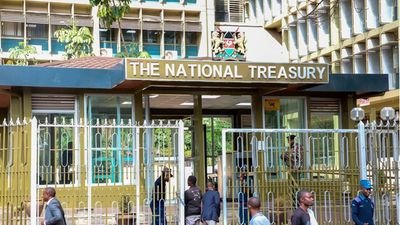

Kenya’s Treasury cuts local borrowing target by $1.12bn
Kenya’s National Treasury has trimmed its domestic borrowing target by Ksh172 billion ($1.12 billion), albeit at a lower cut than the previously projected Ksh270 billion ($1.84 billion).
New budget estimates by the exchequer have reduced the net domestic borrowing target to Ksh411 billion ($2.8 billion) from an approved estimate of Ksh583 billion ($3.96 billion) in June this year.
The Central Bank of Kenya (CBK) had already front run the trim earlier last month, indicating the reduction was anchored on the expectation of higher foreign financing.
Net foreign financing has been subsequently raised to Ksh449 billion ($3.1 billion) from Ksh131 billion ($890.6 million) to mirror the improved prospects for greater external loans.
CBK had tipped the cut in local borrowing to reset interest rates on government securities downwards even as the trim addresses the private sector crowding out.
“We believe that with that reduced domestic borrowing, we will see a reduction in the pressure on interest rates, and also because of the additional external financing, we should be able to have more foreign exchange which will help us build our international reserves,” CBK Governor Kamau Thugge stated.
Doubts on the direction of interest rates on government securities have, however, persisted even before the lower-than-expected trim to the domestic borrowing quota as analysts’ price in more interest rates pressures.
For instance, analysts at Sterling Capital doubted the expected cut to domestic borrowing, noting the reduction was partly pegged on an overambitious revenue target.
“We see this (cut to domestic borrowing) as untenable considering that this is pegged on a 27 percent increase in tax revenue in the current fiscal year over the previous one and a significant increase in external borrowing. We foresee the CBK being more accommodative of higher investor bids in debt auctions at least in the near future,” the analysts stated.
The recently closed auction of re-opened a two and 10-year bond this month for instance recorded weighted average rate of accepted bids at 17.45 and 17.92 percent respectively in contrast to the papers’ 16.97 and 15.03 percent coupon rates.
While Kenya has been mostly locked out from the international capital markets over recent years, concessional lenders such as the World Bank and the International Monetary Fund (IMF) have been significant financiers to the government.
In addition, other multilateral lenders have also stepped in to plug Kenya’s external financing needs including the Trade and Development Bank (TDB) and the African Development Bank (AfDB).
Across the recently concluded 2022/23 fiscal cycle, net domestic financing totalled Ksh459.5 billion ($3.21 billion) while net foreign financing rounded off to Ksh310.8 billion ($2.11 billion).
The external loans comprised of Ksh266.9 billion ($1.81 billion) programme loans and Ksh61.8 billion ($420.1 million) in project loan revenue.
The lower domestic borrowing target is expected to take pressure off the domestic credit market from which the government would require less in financing internally.

















